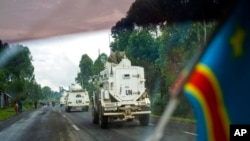The frontlines between government troops and M23 rebels remained calm in the east of the Democratic Republic of Congo on Sunday for a second day running, local residents told AFP, after a cease-fire came into force.
DRC President Felix Tshisekedi attended a regional mini-summit in Luanda on Wednesday, agreeing a deal on the cessation of hostilities in DRC's war-torn east from Friday evening.
M23 rebels, who have seized swaths of territory in recent weeks, were to withdraw from "occupied zones", failing which the East African regional force would intervene.
Local people reported no sign of a rebel pullout by midday Sunday.
Clashes had continued right up to the cease-fire deadline north of the provincial capital Goma, but on Sunday both sides were holding their positions, locals told AFP by telephone.
On Saturday, Mai Mai militia and the Democratic Forces for the Liberation Rwanda (FDLR) fought with M23 for control of a zone northeast of the provincial capital Goma where the national army is not present.
As a result, M23 took over the town of Kisharo, 30 kilometers from the Uganda border, residents said.
AFP was unable to independently confirm the accounts from the locals.
The March 23 group had been dormant for years but took up arms again late last year accusing the government of failing to honor a disarmament deal.
M23 has overrun large tracts of mountainous Rutshuru territory north of Goma, a city of one million which they briefly captured 10 years ago.
The DRC accuses Rwanda of supporting the rebels -- charges Kigali denies and in turn alleges Kinshasa works with the FDLR, a Hutu faction present in the sprawling country since the 1994 genocide of Tutsis in neighboring Rwanda.
The M23 is among scores of armed groups that have turned eastern DRC into one of Africa's most violent regions.
Many of the groups are legacies of two wars before the turn of the century that sucked in countries from the region and left millions dead.








